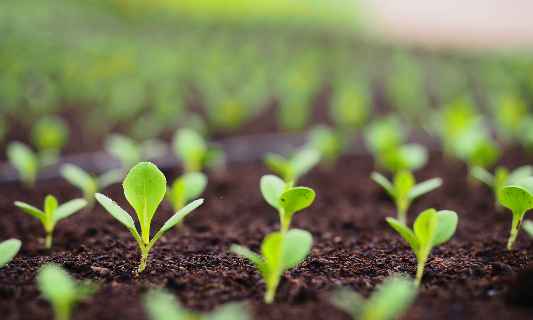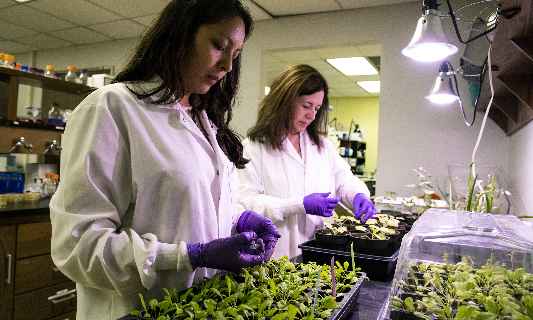Soil Scientist/Plant Scientist
Who Is A Soil Scientist/Plant Scientist
We live in a world with an ever-increasing population and, therefore, an ever-increasing need to feed it too. However, going on a planting spree won’t be an ideal solution, as overfarming comes with its own set of problems. That’s where plant and soil scientists come to our rescue. They study soils and plants and come up with innovative ways to increase crop productivity while making sure that the soil is fertile enough to handle it. This means figuring out how to improve plant production while avoiding soil erosion or pollution.
Soil scientists/ plant scientists study soil in detail. They understand its physical and chemical properties, origin and distribution. They even study the plants that grow best in particular soils and modify their strains to improve the yield. They also work on the conservation and restoration of the environment. As a soil scientist/ plant scientist, you will have to work closely with farmers and solve their crop-related problems while teaching them about nutrient management and soil conservation. You will also work on improving pest management practices. All of this helps farmers grow larger quantities of good crops while maintaining the quality and fertility of the soil.
Roles & Responsibilities
Conducting in-depth studies on the soil. If you have to study the soil of a particular region, you will need detailed insight into its physical, chemical and biological composition. You will also have to understand how it responds to different farming practices, and suggest ways to improve its yield while conserving its fertility.
Utilising topographical and geographical data, as well as the climate of the region that is under study. Studying the soil and plant alone won’t be enough, you will need to conduct an in-depth geographical study involving all the factors that contribute to the growth of plants.
Suggesting ways to improve agricultural productivity. Once you’ve studied the soil, you will be able to estimate its capabilities and limitations and suggest different ways in which farmers can improve the quality as well as quantity of crops.
Modifying the genetic structure of crops. You will use biotechnology or even nanotechnology to tweak the genetic composition of crops such that they develop resistance to diseases and produce a stronger, larger yield. Once you make the necessary modifications, you will have to test your new strain in a replica environment to see if it is producing the desired result.
Aiding environmental conservation. To meet the growing demands of an ever-increasing population, farmers may or may not follow the best farming practices, which often leads to soil erosion, overgrazing and other problems that affect the yield of the crop. As a soil scientist/ plant scientist, you will have to assess the land and figure out the best ways to meet the population’s demands while also conserving the soil. This includes assessing local activities like farming, mining and grazing practices.
Take the Mentoria career assessment test, to find out how well-suited you are as a Soil Scientist/Plant Scientist.
Discover your Ideal future
Get expert guidance and mentorship towards your perfect fit.
What Skills Will I Need To Have To Do This Job Well?
As exciting as this sounds, there are some things you’ll need to learn to do the job right:
BIOTECHNOLOGY SKILLS
You will need biotechnology to manipulate the genetic structure of crops. A sound understanding of the subject, along with an understanding of genetics and even nanotechnology will help you enhance the strain and achieve the desired result.
STATISTICAL SKILLS
When working as a soil scientist/ plant scientist, you will have to crunch hundreds and thousands of data points in a laboratory, so you will need to know the best practices in statistics.
CRITICAL THINKING SKILLS
While developing a new strain, you will have to pick up critical insights from your data findings and know how to apply them. This requires sound critical thinking and logical reasoning skills.
PROBLEM-SOLVING SKILLS
This comes from being an expert in your domain, as well as approaching challenging projects with an agenda of problem-solving. This skill will help you determine the best course of action in every situation.
PRESENTATION SKILLS
While often overlooked, presentation skills are critical in this field, as you will have to talk about your findings or research work. As nobody can talk about your work better than you, presentation skills are critical to get your point across, both to explain it, as well as to raise funding for your work.
What Will My Workplace Look Like?
Your work life will have a lot to do with where you work, what role you play and the scale of your job. Most soil scientists/ plant scientists work out of offices and laboratories, where they conduct research and modify the genetic structures of crops. However, you will also have to spend time outdoors, collecting samples and inspecting the soil and crops for your study.
If you’re a part of an organisation or government agency, you will be given a research grant to fund your trials, along with guidance from senior scientists and access to large databases. Once you gain experience, you could become a managerial or research scholar role and lead projects where others may perform tests under your guidance.
Most soil scientist/ plant scientists have regular 40-hour work weeks, although this may change when you have to conduct site visits.
What Is My Scope For Career Growth As A Soil Scientist/Plant Scientist?
If you are entering the industry for the first time, you will need to apply as an intern or for a starting position at any bio-research firm or government agency (such as the Indian Institute of Soil Sciences). They will guide you in performing research studies and arriving at an analysis efficiently. The scientists working with you will help you in your journey as you go from research intern to research programmer/assistant or full-time researcher.
After you’ve worked for a few years, you can begin creating your own research studies, applying for grants and research, and working with other scientists and researchers across the globe. You can even participate, speak and network at high-profile doctor seminars and events. Here, you get to network with other researchers and learn more about the latest advancements in your area of study.
You can extend your research work with a grant from a pharmaceutical company or government agency, and create direct research that will fund further advancement in your career and industry.
Thinking of a career as a Soil Scientist/Plant Scientist? Take the Mentoria assessment test & talk to our career counsellors to get personalized step-by-step guidance for your future career path.
How Much Will I Get Paid?
The exact number will depend on where you’re working, your education, skill-set and internship experience. But we can give you a general idea.
As a research assistant, you can earn between INR 4,00,000 to INR 5,00,000 per year in India. At a managerial level, you can earn between INR 8,00,000 and INR 10,00,000.
Okay, I'm sold. This is amazing

STEP 1: Class XI-XII/Junior College
Choose the science stream after class 10, and take up biology, mathematics and statistics as subjects.

STEP 2: Entrance Exams
Depending on the course you pick, you might have to appear for entrance exams to pursue an undergraduate degree. These courses are usually offered by private schools, sometimes in affiliation with international universities. Hence, the admission criteria vary widely from one course to another and even one college to another.

STEP 3: Graduation
You could pursue a bachelor’s degree in Agricultural Science or Biotechnology to gain an entry-level job in this field. However, this degree will only help you get involved in the product development stage. If you wish to become a researcher in this field, you will have to obtain your master’s or a PhD.

STEP 4: Internship
You can look for an internship at a research firm or a pharmaceutical company. You could even choose to work under a biotechnology professor. Your internship will help you understand the basics of field studies, and you will be given tasks that contribute to the overall production of research material.

STEP 5: Post-graduation
After completing your bachelor’s degree, you should pursue an MS in Biology, or Plant Sciences from a university in India or abroad. Depending on where you’d like to pursue your PhD, you will need to find a good university with great courses that will help you learn further.

STEP 6: PhD
A PhD will help you secure a research position at a university level. You could also secure a job with the Indian Institute of Soil Science (ICAR-IISS) and contribute to significant research studies.

STEP 7: Land a Job
Once you’ve completed your education, you are ready to apply for a job! You could work with a pharmaceutical company, any government organisation or even teach at a university and devote your time to research.
Congratulations, you are now officially a soil scientist/ plant scientist!
Sign Up for Mentoria - India’s Most Reliable Career Discovery Platform
Mentoria promises to handhold you during your career discovery journey - from the time you sign up until you get into a career you love.
Discover your Ideal future
Get expert guidance and mentorship towards your perfect fit.


